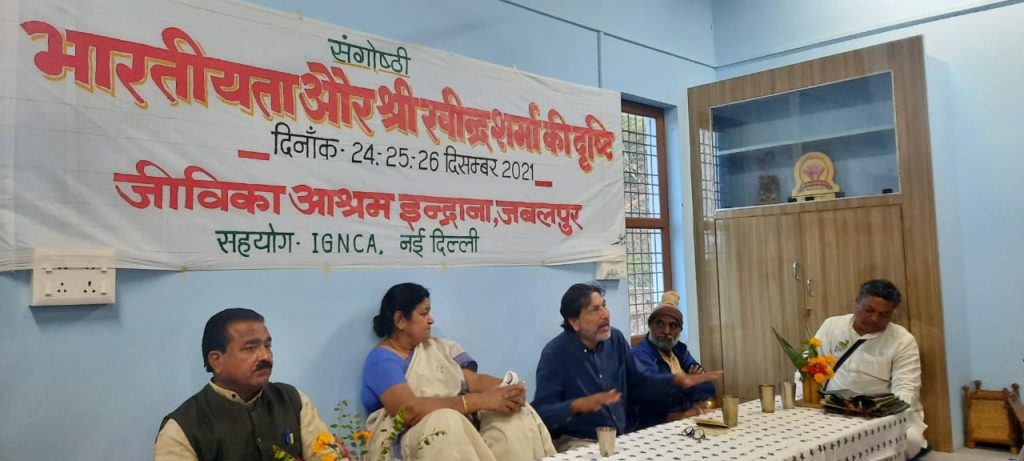(A 3-day sangoshthi was held at Jeevika Ashram (Indrana) near Jabalpur, 24th-26th December 2021, on “Bhārtiyatā and the perspective of Ravindra Sharma “Guruji”, with contributions of around 50 participants from different parts of the country. The event was organized with the support of IGNCA, Delhi)
According to Nirukta, Bhārat is that – “prajā bharaṇa rupa” (Vāyu Puraṇa 10.45.76)

About 40km north of river Narmada in Jabalpur, about 12 km short of the 11th century Vishnu-Varaha sculpture, lies the unassuming Jeevika Ashram (near village Indrana) where Ashish and Ragini live with their daughters. As Ashish bhai succinctly puts it, Jeevika Ashram’s efforts are towards riṇapoorti of Guruji Ravindra Sharma. Almost all of us gathered for this 3-day meet have been nudged by Guruji in some way or the other. This gathering does not carry any hesitation towards the potential that is called Bhārat or Indic tradition. The sentiment towards the promise of tradition was shared by all, and hence one would naturally expect a conversation here to have seriousness.
The question however, as Pawanji emphatically said on the opening day, is not of understanding Bhārtiyatā alone, but equally important is to develop a critical understanding of western modernity which has had a debilitating impact on local cultures across the world. All of the first day was spent on this concern- how modernity has debilitated us, the people of Bhārat.
I think, as important as it is for us to have faith in Bhārat, equally important is for us to understand how western modernity works. I see no reason for us to be shy about this, to be hesitant about this. However, this is not easy. We live in times, where we conflate modern ideas with Indic ideas, often innocently. Listening to some of the speakers on the first day (and even on later days), I got this impression. Listening to many of the questions asked by the audience, I got a similar impression.
I thought it was important to spend one whole day on this question. It is certainly a difficult question to handle in public, as inevitably one is accused of hypocrisy, of over-simplification and of one-upmanship. These criticisms are valid and in fact even necessary for they prevent us from falling into an echo chamber and mutual back scratching. However, we also need not get disheartened from them, nor get defensive about our own shortcomings. In Pawanji’s words- “we are both victims and perpetrators of modernity”, acknowledging it does not mean embracing our fall or justifying it.
(Next week we will talk more about what was discussed during the 3 day sangoshthi)